Regime MP Claims Hijab Is An Order Of God

A regime member of parliament claims wearing the hijab is a timeless commandment by God.

A regime member of parliament claims wearing the hijab is a timeless commandment by God.
Morteza Aghatehrani, the chairman of the Parliament's Cultural Committee, went as far as to say that all legislation should follow the orders of God.
His remarks come amidst mass rebellion against regime mandated hijab, with women refusing to wear them in public and burning them on the streets.
Meanwhile, Hassan Rahimpour Azghadi, an ultraconservative commentator who usually speaks on Iranian national television as a member of the Cultural Revolution Council, claimed on Thursday that "the removal of hijab is because they [enemies] want to return us to the pre-revolution era.”
He further claimed that the 'enemies', referring to the likes of the US and Israel, want to turn the celebrities of the Shah’s time into heroes for today's generation.
The regime continues to enforce the hijab both covertly and overtly, with the likes of hijab patrols and surveillance techniques across the country as it fights the ongoing hijab rebellion, sparked by the death in morality police custody of Mahsa Amini. The 22-year-old was arrested for the 'improper' wearing of her hijab in September, sparking a nationwide uprising.
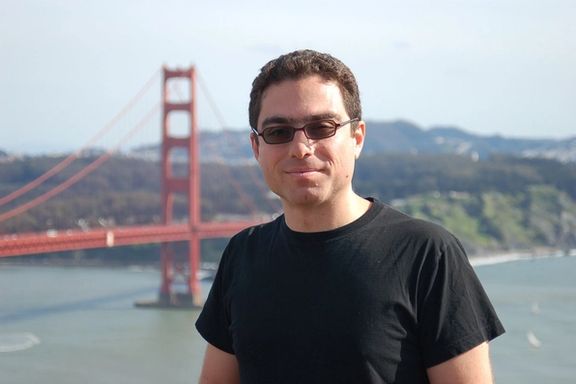
Disclaimer: The following report was published based on reports in the Iranian media on Thursday that they later changed and admitted their news was wrong.
An American hostage in Iran, Siamak Namazi, has informed his family that Iranian authorities have told him he will be freed soon, media in Iran reported Thursday.
UPDATE - Later on Thursday Shargh newspaper in Tehran quoted Namazi's lawyer as saying that he did not tell his family about his possible release and the news was totally false.
The news was brief and there were no details. It has not been confirmed by the US government or directly by the family, but the development comes after multiple reports of talks between Tehran and Washington to release Americans held by the Islamic Republic in exchange for Iran’s frozen funds abroad.
Iran International reported last week that talks were taking place to release Iranian funds held in South Korea in exchange for possibly three Americans who were arrested over the past eight years and convicted on unsubstantiated charges in sham trials, without due process of law.
A source with direct knowledge of the talks had told Iran International that talks had made progress and focused on Iranian funds held in Iraq and South Korea.
Around $7 billion is held by two South Korean banks, due to US financial sanctions on Iran. The funds represent Seoul’s debts to Tehran for importing oil before US sanctions fully kicked in in May 2019.
Those funds would be released in exchange for the hostages while more than $10 billion held by Iraq due to US sanctions could be released in exchange for Tehran to show more “flexibility” in nuclear talks, the source said.
US sanctions have driven Iran’s economy into a serious crisis, with the country unable to generate much oil export revenues. It has spent almost all of its foreign currency reserves, with inflation nearing 70 percent and the national currency having lost half its value in less than a year.
Nour News in Tehran affiliated with the National Security Council posted a cryptic tweet Thursday saying that Iran has tried for a long time to arrange a “prisoner exchange” out of its “humanitarian concerns” but the United States unnecessarily delayed an agreement. The tone used seems to indicate an agreement has now been reached.
Currently there are three dual nationals with American citizenship and two individuals with US permanent residency held by Iran on trumped-up charges of espionage.
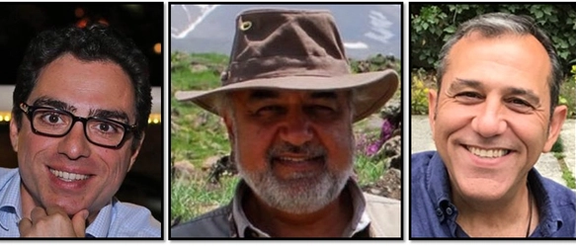
The three citizens are Siamak Namazi, Emad Sharghi and Morad Tahbaz, while Jamshid Sharmahd and Shahab Dalili are US permanent residents.
In a White House briefing on Wednesday, national security coordinator John Kirby was asked about the recent trip of Oman’s Sultan to Tehran as a sign of indirect talks. Kirby responded that “We have — we have multiple ways of communicating with the Iranians. I’m not really sure I understand what you’re getting at.”
However, it is widely believed in Tehran that the Omani ruler, Sultan Haitham bin Tariq al-Said’s visit was primarily a mediating mission. Oman has played the role of a go-between with Tehran on several occasions.
Axios recently reported that Brett McGurk, President Joe Biden’s senior Middle East adviser, took a low-profile trip to Oman earlier this month for talks on possible diplomatic outreach to Iran.
This was an indirect confirmation of Iran International’s earlier report about ongoing talks on release of Iran’s blocked funds.

Iranian activist Masih Alinejad has expressed support for the Ukrainian athlete who refused to shake hands with an Iranian competitor.
At the World Bench Press Championships in South Africa on Tuesday, Ukrainian powerlifter Ivan Chuprynko refused to shake hands with the Iranian athlete, Amir Reza Mesforoush, in an apparent statement against Iran's arming Russia in its invasion of Ukraine.
"I fully defend the move by the Ukrainian athlete," said Alinejad in a tweet adding that "the athletes who decide to compete under the flag of Iran represent the Islamic Republic."
During the award ceremony, Chuprynko shook hands with the South African athlete and did not even turn towards Iranian Amir Reza Mesforoush. Ivan declined to shake hands with the Iranian representative twice, and Mesforoush shrugged his shoulders in response.
The condemnation puts Iran's athletes in a difficult predicament. Many have spoken out against the regime oppression, but continue to compete and represent the Iranian people.
After the World Cup rebellion in which players refused to sing the anthem, several of the country's football team were given punishments including flight bans and pay cuts.
One of the country's leading chess players competed on the world stage without her headscarf and was subsequently unable to return home.
Several countries such as the US and European Union have sanctioned Iran for its provision of drones in Russia’s war on Ukraine.
Iran has denied sending drones to Russia for months, but with increasing evidence, Foreign Minister Hossein Amir Abdollahian finally admitted the issue in November last year. However, he claimed that the deployment of drones was "limited and before the war in Ukraine".
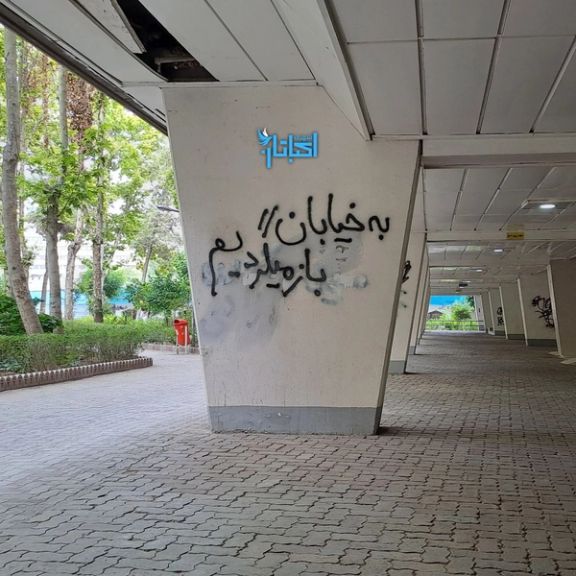
Despite severe repressions, the protests against the clerical regime continued Wednesday night.
People in several districts of Tehran held gatherings after Persepolis soccer club won the Hazfi cup.
In the restive Ekbatan neighborhood west of Tehran, protesters chanted slogans against Supreme Leader Ali Khamenei saying, “So Many Years of Crime, Death to the Leader”.
Another video shows people urging the release of imprisoned rapper Toomaj Salehi during the Wednesday night protests.
Earlier in the day, and during the final match of Hazfi cup between two popular soccer clubs of Tehran, fans shouted the name of two dissident players Ali Karimi and Voria Ghafouri.
Voria Ghafouri, the popular former captain of Iran's top football club Esteghlal, had earlier announced he is going to end his professional career on Wednesday during the derby match between Esteghlal and Persepolis.
However, the security agents reportedly did not let the popular footballer enter the stadium in fear of anti-regime protests and slogans.
The football star who was fired from his team for criticizing the government, decided to retire very soon but not to give in to the regime’s demands. His early retirement drew reactions from opposition figures including Masih Alinejad who praised his decision.
Amid the extreme suppression of protesters, Iranians take every single opportunity to express anger at the Islamic Republic and its brutalities.
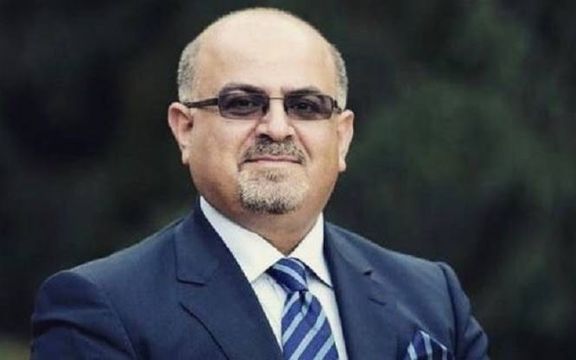
An Iranian lawyer says the Iranian Revolutionary Court is not qualified to investigate the charges of two imprisoned journalists who covered the death of Mahsa Amini.
“According to the constitution, the branches of the Revolutionary Court do not have the jurisdiction to deal with political and journalistic cases,” said Arash Keikhosravi.
He said that according to law, Elahe Mohammadi and Niloufar Hamedi should have been released by now and their case should have been referred to one of the branches of the Criminal Court.
Their case has to be investigated in the presence of a jury in an open court, so that justice can be served, he added after the first hearing was held Monday in Tehran behind closed doors.
The two journalists have been charged with propaganda against the regime and conspiracy to commit acts against national security, which could bear death sentences.
Hamedi managed to visit Mahsa Amini in Tehran’s Kasra hospital and broke the news of her grave condition after being taken into the custody of the morality police three days earlier for wearing her hijab “improperly”. Amini was in a coma at the time.
Mohammadi, likewise, managed to travel to Amini’s hometown of Saqqez in western Iran to report on her funeral on September 17, which thousands attended.
The US State Department has called the "sham" trial a "mockery of justice" and shows the Islamic Republic's fear of journalists.
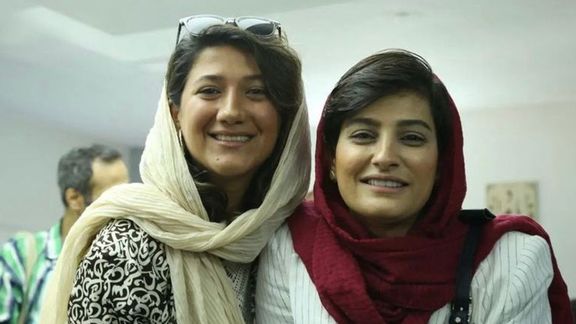
Reporters Without Borders (RSF) condemned the trials of Niloofar Hamedi and Elahe Mohammadi who first reported the death in custody of Mahsa Amini in September.
Calling the trials “sham” in a statement Tuesday, RSF said the two journalists who have been in detention since a few days after Amini’s death should be freed at once instead of facing possible death sentences.
The two journalists have been charged with propaganda against the regime and conspiracy to commit acts against national security, which could bear death sentences.
“The fact that Niloofar Hamedi and Elaheh Mohammadi were unable to see their lawyers, even a few days before their trials, confirms that this is travesty of justice whose sole aim is to legitimise the persecution of these two journalists. We demand their immediate release,” Jonathan Dagher, head of RSF’s Middle East desk, said.
In a tweet Tuesday, RSF also said banning the lawyers of the two journalists from speaking at their hearings was “further proof of the judicial farce against the two journalists.”
Hamedi, managed to visit Mahsa Amini in Tehran’s Kasra hospital and broke the news of her grave condition after being taken into the custody of the morality police three days earlier for wearing her hijab “improperly”. Amini was in a coma at the time.
Mohammadi, likewise, managed to travel to Amini’s hometown of Saqqez in western Iran to report on her funeral, September 17, which thousands attended.
The lawyers for Niloofar Hamedi, a reporter of the reformist Shargh daily, and Elahe Mohammadi, of the reformist Ham-Mihan newspaper, were banned from speaking at the 1st hearings.,” RSF tweeted Tuesday.
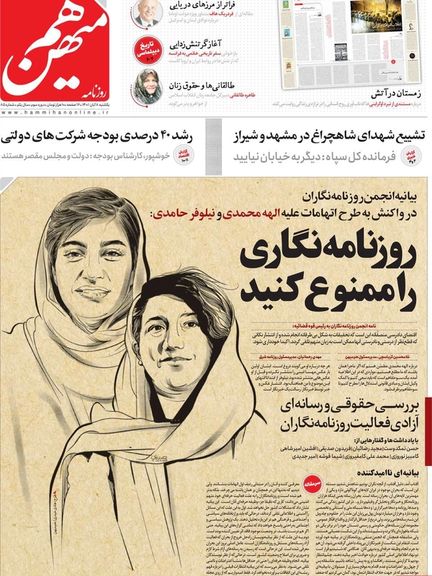
The first session of Mohammadi’s trial presided by the notorious judge Abolghasem Salavati was held behind closed doors at Branch 15 of the Revolutionary Court of Tehran on Monday. Hamedi’s hearing was held on Tuesday by the same judge and in the same manner. Lawyers of the two journalists were not allowed to speak.
Hamedi’s husband, Mohammad-Hossein Ajorlou who is a sports journalist himself, in a series of tweets Tuesday confirmed that Hamedi’s lawyer had not been given an opportunity to speak and said family members, including himself, were not allowed in the courtroom. According to Ajorlou’s tweet the date for the next hearing has not been set.
The Telegram channel of the ultrahardliner Raja News claimed that “anti-Iranian media” are trying to “reduce” the arrest of the two journalists to their coverage of Mahsa Amini’s death.
“But reliable information indicates that Niloofar Hamedi and Elaheh Mohammadi had participated in training courses of institutions that seek the overthrow [of the Islamic Republic] and had connections with foreign intelligence services,” Raja News which is affiliated to the ultraconservative Paydari Front wrote.
In October, Iran's intelligence ministry and SAS, the intelligence organization of the Revolutionary Guards (IRGC) accused Mohammadi and Hamedi of being CIA agents. “Using the cover of a journalist, she was one of the first people who arrived at the hospital and provoked the relatives of the deceased and published targeted news,” they said in a joint statement.
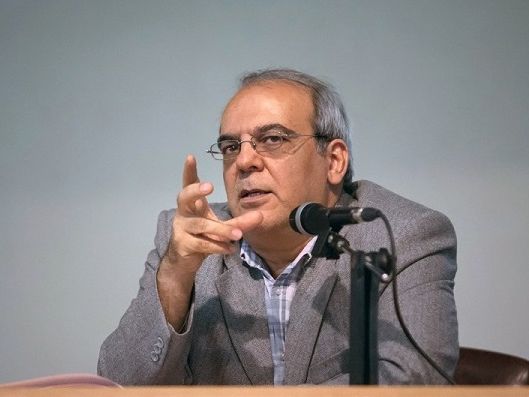
Abbas Abdi, a reform bloke politician said in a May 23 tweet that the government twists charges against dissidents to avoid open trials and demanded that the two journalists be tried publicly according to article 165 of the Iranian Constitution.
The Iranian Constitution stipulates that trials of political prisoners and journalists should be public and with the presence of a jury.